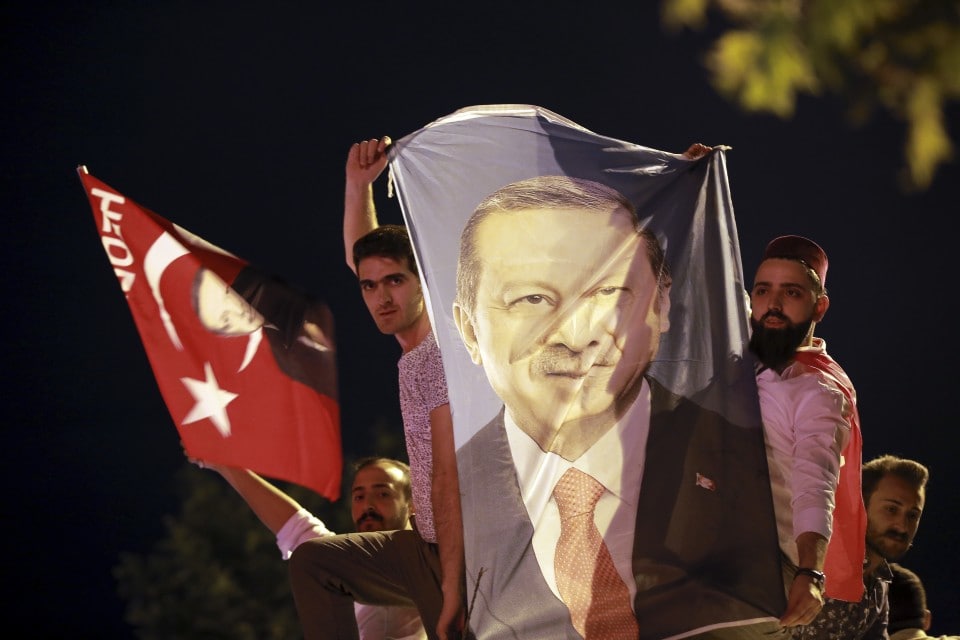Suat Kiniklioglu was formerly deputy chairman of external affairs for Turkey’s Justice and Development Party (AKP) before parting ways in 2012. He is a senior fellow at the Institute for Security & Development Policy.
Turkey’s presidential and parliamentary election yesterday was probably the most unfair and unfree election in living Turkish memory. President Recep Tayyip Erdogan’s government dominated the media, abused access to all government and municipal resources, and benefited from a state of emergency in suppressing the opposition campaign.
Because access to the media was tightly controlled, the opposition had an incredibly hard time reaching out to the electorate. Worse, Selahattin Demirtas, leader of the pro-Kurdish Peoples’ Democratic Party, campaigned from his prison cell. In spite of these conditions and calls for a boycott early on, the Turkish opposition still chose to take part in this election. One reason for that was the hope that Meral Aksener and Muharrem Ince, candidates for the Iyi Party and the Republican People’s Party (CHP) respectively, injected into the opposition.
Erdogan won the presidential election thanks to his alliance with the ultra-nationalist Nationalist Movement Party (MHP), which gave him just under 53 percent of the vote. Ince, the CHP candidate, obtained 30.6 percent — more than his party has received in decades. The imprisoned Demirtas obtained 8.4 percent, while Aksener — the only female candidate — only managed to score 7.3 percent. In view of the mobilization and enthusiasm of the opposition, expectations were high that the race could be forced into a second round, but Erdogan managed to pass the necessary 50 percent threshold.
In the parliamentary election, Erdogan’s ruling Justice and Development Party (AKP) got 42.5 percent, 7 percent less than in the previous election, forcing it into an alliance with the MHP, which surprisingly obtained 11 percent. Erdogan, who argued for years in favor of an executive presidency in order to avoid coalitions, is now forced into a coalition with an ultranationalist partner that is likely to extract significant concessions from him. This alliance also means that there will be no relaxing of the government’s policies toward the Kurds and in Syria.
The outcome of this election once again demonstrates that Erdogan’s strategy of polarizing the electorate works. Major shifts among the electorate occurred not between the pro-Erdogan camp and the opposition camp, but within them. The demonization of the opposition, exacerbated by Erdogan’s ultimate media dominance, has prevented major shifts from one group to the other.
This outcome also reveals the durability and strength of nationalism in Turkey. The AKP, MHP and Iyi are all nationalist parties and so is the CHP to some extent. Hence, nationalism remains one of the most dynamic forces of Turkish politics.
Erdogan’s election success comes at a time when the Turkish economy is increasingly fragile. Inflation and unemployment are on the rise, and the Turkish lira lost more than 20 percent in the last six months. But instead of voting for the opposition, Turkey’s conservatives seem to have decided that Erdogan is their best bet to overcome an impending economic crisis. Polarization and identity politics continue to be powerful factors, preventing voters from seeking alternatives even under such dire economic conditions.
On the foreign policy front, Turkey is likely to continue to be a problematic partner to the West, seeking more of a transactional relationship than one based on common values. Erdogan will most likely try to capitalize on his new mandate and seek to extract concessions from the United States in Syria and prevent military sanctions from brewing in the U.S. Congress. He is likely to reach out to the European Union on migration, visa liberalization and financial assistance — but the fundamentals of that tense relationship have not changed.
The new powers acquired by this election grant Erdogan almost total control over the levers of the state. The new presidency means that he will have almost no checks and balances imposed on him, though he will remain dependent on his collaboration with the MHP in parliament. It effectively means one man controls the entire state machinery without any meaningful separation of powers. Erdogan will continue to rule Turkey in an authoritarian fashion, aiming to shape the country in his image.
However, the energy and dynamism generated by Ince’s campaign demonstrate that Turkey’s opposition remains alive and can be mobilized. The primary challenge for the opposition will be to quickly resurrect itself out of the trauma of this defeat. Turkey will hold local elections in March 2019, which presents an opportunity for the opposition to reconstitute itself. For that to happen, Ince will need to challenge CHP leader Kemal Kilicdaroglu for the party’s chairmanship.
This election has once again underlined how culturally and politically divided Turkey is. The country is split down the middle like an apple, with half of the country for Erdogan and the other against him. Tension around crucial issues such as secularism, education and freedom of expression will continue to strain society.
This was produced by The WorldPost, a partnership of the Berggruen Institute and The Washington Post.





